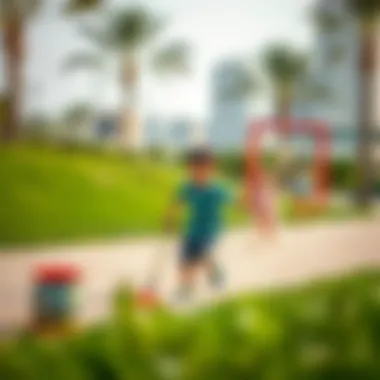Family Life in Dubai: A Guide for Relocating Families


Intro
Relocating to a new city is never a walk in the park, and Dubai is no exception. For families eyeing this glittering city, it’s crucial to bear in mind that adjusting to a new environment encompasses far more than just finding a house or school. Families need to consider an entire spectrum of factors, from local customs to long-term financial planning.
Embracing the amazing diversity, educational prospects, housing options, and lifestyle changes will make the transition smoother and ultimately more fulfilling. Understanding the local market trends can help families make informed decisions, be it for renting or buying. Let’s dive into what you need to know in order to navigate family life in this vibrant metropolis.
Understanding Dubai as a Family Destination
Dubai, with its unique blend of modernity and tradition, serves as an intricate tapestry of experiences for families considering relocation. This city stands tall as a beacon of opportunity, boasting a wealth of advantages that cater to families from all walks of life. Families are drawn to the emirate not only for its vibrant lifestyle but also for the outstanding resources it offers.
When families contemplate a move to Dubai, they must consider several significant factors that frame the family experience. The city’s demographics, which encapsulate a diverse range of nationalities and cultures, create an enriching environment for all ages. This diversity helps foster both cultural awareness and social integration—key elements for families seeking a supportive community.
Another vital component is educational opportunities. Dubai is home to a multitude of world-class international and private schools, offering a range of curricula that cater to different educational philosophies. Parents can choose institutions that align with their values and expectations for their children’s education, ensuring a nurturing learning environment is within reach.
Moreover, the city’s emphasis on safety and quality healthcare adds another layer of reassurance. Those moving to Dubai can go about their daily lives knowing that both their family and their health are safeguarded under robust regulations and systems.
Cultural dynamics also significantly influence family life in Dubai. Aligning traditional family values with the modern lifestyle prevalent in the city can sometimes be a balancing act. Understanding these cultural nuances helps families adapt quicker and integrate seamlessly into the fabric of life in Dubai.
In short, understanding Dubai as a family destination goes beyond mere relocation—it's about embracing a lifestyle rich with opportunities, community diversity, and support structures that facilitate not just survival, but a fulfilling life experience.
"Families looking at Dubai often find a landscape fertile for growth, both personally and as a community. It's a patchwork of cultures, traditions, and modern conveniences, making it a unique place to raise children."
Demographics and Diversity in Dubai
Dubai’s population mirrors a remarkable blend of cultures, languages, and traditions, making it a global crossroads. As of recent estimates, over 200 nationalities call Dubai home. This melting pot creates a dynamic social environment where families can immerse themselves in various traditions.
The diverse backdrop significantly enriches children's experiences. For example, children attending school in Dubai meet peers from all over the globe, allowing them to expand their worldviews beyond their immediate language or cultural limits.
Families will also find that the emirate takes significant steps to promote tolerance and mutual respect. This is executed through various cultural events and initiatives aimed at celebrating the multicultural ethos, ensuring families can enjoy a sense of belonging.
Cultural Dynamics and Family Values
Cultural dynamics in Dubai influence how families interact and develop values. While the city embraces a fast-paced, modern lifestyle, it is essential to recognize the importance of family ties and traditions that underlie everyday life. Family values remain paramount, with many local customs emphasizing respect, hospitality, and strong familial relationships.
Additionally, the cosmopolitan nature of Dubai encourages an exchange of values between various cultures. For instance, international expatriate families may blend their traditions with local customs, fostering a vibrant household culture.
However, some families may need time to adapt to these dynamics, as balancing respect for local traditions while retaining one's cultural identity can be a delicate dance. Embracing understanding and openness can pave the way for smoother integration into this fascinating lifestyle.
Educational Opportunities for Families
In today’s fast-paced world, the education of children stands at the forefront of parents' minds, particularly when relocating to a new city. For families moving to Dubai, its educational framework showcases a diverse range of options, catering to various needs and backgrounds. This choice is crucial not just for helping kids fit in but also for enhancing their social and academic skills. The quality of schooling can significantly impact a family's experience in the city, hence understanding the educational landscape becomes essential.
Overview of the Education System
Dubai’s education system is multifaceted, reflecting the city's multicultural environment. The government closely regulates private and international schools, often ensuring a consistent quality of education and access to diverse curricula. This regulatory framework helps families feel reassured about the standards being met across different educational institutions. Each school usually aligns its curriculum with an international educational framework while respecting local culture and values, which can ease the transition for expatriate families. A point worth noting is that Dubai typically follows a school year that runs from September to June, which might differ from other regions.
Types of Schools Available
Selecting the right school for children can be a daunting task, especially with the variety of options available. Generally, three main categories dominate Dubai’s educational landscape:
International Schools
International schools in Dubai offer a significant advantage for expatriates. Primarily, these schools follow globally recognized curricula such as the British, American, or International Baccalaureate systems. This alignment with international standards makes it easier for families to transition between countries without educational hiccups.
A key characteristic of international schools is their cultural diversity; students learn in an environment enriched by peers from various backgrounds, fostering cultural sensitivity and collaboration. However, one should be aware that tuition fees can be quite steep, which might require careful budget planning.
Advantages:
- Globally accepted qualifications.
- Diverse student body promoting multicultural understanding.
Disadvantages:
- High tuition costs may not be feasible for all families.
Private Schools
Private schools, though less diverse in curriculum options than international schools, offer specialized education tailored to meet the needs of local and expatriate communities. These schools might adopt British, American, or UAE national curricula, but often bring unique pedagogical approaches or specific educational philosophies that cater to particular student populations.
One appealing feature of private schools is their generally smaller class sizes, which can lead to more individualized attention for students. Many private schools also provide extracurricular activities that further enhance children's learning experiences. The only caveat is that, similar to international schools, tuition doesn’t come cheap.
Advantages:
- Personalized learning due to lower student-to-teacher ratio.
- Often includes robust extracurricular programs.
Disadvantages:
- Fees can also be high.
Public Schools


Public schools in Dubai provide a beneficial option for families, particularly those on a tighter budget. Open to both local Emirati students and expatriates, these schools follow the UAE’s national curriculum, heavily emphasizing Arabic language and Islamic studies alongside general education subjects.
Public schools have been recognized for giving quality education, though they may be more attuned to local culture. This aspect can be an advantage for expatriate families wanting to immerse their children in Arabic language and cultural practices. Despite this, one must consider potential language barriers, especially for non-Arabic speaking children.
Advantages:
- Generally lower or no tuition fees.
- Exposure to local culture and language.
Disadvantages:
- Limited availability for non-local students.
- Language barriers might be a concern.
Assessing School Quality and Curriculum
When exploring educational options in Dubai, assessing school quality and curriculum is a pivotal aspect for families. Key indicators like the school's accreditation status, teacher qualifications, and student performance metrics can offer insights into the level of education provided. Many schools publish annual reports or have dedicated sections on their websites detailing curriculum details, achievements, and even community engagement initiatives.
Families should consider visiting potential schools, participating in open days, and seeking feedback from other parents about their experiences. Engaging in this firsthand research can make the daunting task of selecting a school far less overwhelming. By investing time in understanding the educational landscape, families stand to enhance their children's futures in this dynamic city.
Housing Considerations for Families
Relocating to Dubai brings with it a multitude of considerations, particularly in the realm of housing. For families, finding the right home is not just about aesthetics; it encompasses aspects like neighborhood vibe, proximity to schools, and access to essential services. Housing significantly influences the overall experience of family life in this dynamic city, making it an essential factor to evaluate during the relocation process.
Family-Friendly Areas in Dubai
Community Features
One attractive characteristic of family-friendly areas in Dubai is their community features. Unlike the hustle of the city center, these neighborhoods, like Arabian Ranches and Jumeirah Village Circle, typically offer a sense of belonging. Residents often find themselves engaged in community activities, including local festivals and sports events, fostering deeper connections among families.
Unique aspects, like parks and playgrounds, are often at the heart of these communities. Parents appreciate the ample open spaces where children can play and explore safely. However, it's worth noting that while such amenities enhance the living experience, some neighborhoods might face the issue of overcrowded public spaces, particularly on weekends.
Accessibility and Amenities
When considering accessibility and amenities, family-friendly areas excel in providing convenience. Most communities boast a variety of amenities, from supermarkets to healthcare facilities, which ease the daily grind for families. For instance, communities like Dubailand have everything you need within a short drive, allowing for quick trips even during rush hour.
A standout feature in these areas is their proximity to quality schools and daycare centers. Having these institutions nearby reduces the stress of daily commutes for parents and ensures children can engage in after-school activities without a logistical headache. Nevertheless, families should also consider that some neighborhoods may lack diversity in retail options, limiting shopping variety.
Types of Housing Options
Condos
Condos represent a popular choice among families looking for connectivity and community vibe. Often found in areas like Dubai Marina and Downtown, these units provide easy access to coastal walks, shopping, and cultural hotspots. A key factor that makes condos attractive is the potential for amenities such as pools, gyms, and 24-hour security, giving families both comfort and peace of mind.
However, living in a condo may come with some downsides. Some units can be cramped, making it challenging for larger families to navigate personal space comfortably. Noise from neighbors can also be a concern, particularly in busier complexes.
Villas
Villas, with their spacious layouts and private gardens, are another appealing option for families. Areas like Emirates Hills and Jumeirah offer luxurious villas that often come with a swimming pool and more green space. This feature allows children to play outside safely and gives families a sense of privacy.
What distinguishes villas is their potential for customization. Families looking to personalize their living space might find villas more suitable than other housing types. On the flip side, the maintenance of such properties can be quite demanding, and villa living typically comes with a higher price tag, which some families might find hard to stretch for.
Apartment Complexes
Apartment complexes present yet another viable route for families considering a move. Locations like Dubai Silicon Oasis and Discovery Gardens offer spacious units within well-planned communities. These complexes often provide shared amenities, such as pools and fitness centers, creating a self-contained environment that appeals to families of all sizes.
A major advantage is the availability of more affordable, spacious living options compared to standalone homes. On the downside, similar to condos, apartment complexes may have limitations regarding noise insulation and privacy, particularly for larger family units.
Navigating Rental Agreements
Finding the right housing option is just one part of the puzzle; families must also navigate the intricacies of rental agreements. In Dubai, rental contracts are typically for one year, requiring a significant cash advance or bank guarantees.
It’s important for families to read the fine print carefully, paying close attention to clauses regarding maintenance responsibilities, notice periods, and potential renewal options. Moreover, seeking the advice of a local real estate agent can offer insights into current trends and conditions, ensuring families make informed decisions.
Recreational Activities for Families
When moving to Dubai, understanding the recreational activities available for families is crucial. It contributes significantly to the overall quality of family life, fostering bonding and providing entertainment. In Dubai, the range of recreational activities can help families create lasting memories and enjoy leisure time together. Outdoor experiences, cultural education, and engaging events all play a role in shaping a fulfilling family life.
Parks and Outdoor Spaces
Dubai boasts a variety of parks and outdoor spaces ideal for family outings. These green havens provide a welcome respite from the city's fast-paced lifestyle. Parks like Al Barsha Park and Zabeel Park offer ample amenities, including playgrounds, jogging tracks, and picnic areas.
Families can enjoy weekend outings, engaging in activities such as cycling, kite flying, or simply soaking up the sun. The well-maintained facilities cater to all age groups. The real draw is the lush landscaping contrasted against Dubai's sometimes harsh climate. Each park has its unique charm, with amenities ensuring fun without breaking the bank, making them an invaluable part of family leisure.
Cultural and Educational Attractions
Museums
Dubai's museums stand out as enriching experiences compressed into fun presentations. They provide insights into history and culture that go beyond textbooks. For instance, the Dubai Museum within Al Fahidi Fort preserves the city's heritage, showcasing how Dubai evolved from a small fishing village to a global hub.
A notable feature of Dubai's museums is their interactive setups, which captivate both young and older visitors alike. Given the city's melting pot of cultures, learning here offers exposure to various perspectives. However, some families might find museums lacking in specific resources compared to more developed cities. Still, the unique value they offer in understanding Dubai's lineage cannot be understated.


Galleries
Art galleries in Dubai, such as the Alserkal Avenue galleries, function not just as exhibition spaces but as cultural melting pots. These venues host a wide range of contemporary art, providing platforms for emerging artists. They allow families a glimpse into various artistic expressions while encouraging creativity and discussion among family members.
A unique feature here is the regular art walk and interactive sessions for families that emphasize community involvement, which fosters greater connections. Yet, some families may find the art scene somewhat niche, concentrating more on modern themes rather than traditional art forms.
Historical Sites
Exploring historical sites like the Al Fahidi Historic District offers another dimension to understanding Dubai. These locations tell the story of the city's past, providing insights into local architecture and lifestyle through the ages. Taking a walk through the narrow lanes allows families to visualize life centuries ago.
A key characteristic is the community-led initiatives to restore and maintain these historical narratives. Families gain a deeper appreciation for their new environment, which can be a refreshing experience; however, exploration might require more planning compared to typical tourist sites.
Family-Friendly Events and Festivals
Dubai's calendar is loaded with family-friendly events and festivals. From the Dubai Shopping Festival featuring entertainment zones to the International Kite Festival, these events create opportunities for family engagement and fun. Each occasion offers unique experiences, allowing families to bond over shared activities and challenges.
Additionally, seasonal festivals often highlight multicultural aspects, ensuring a mix of local and international flavors that resonate with a diverse population. On many occasions, these events integrate sports and arts, appealing to younger and older attendees alike, thus making them perfect outings for families.
Coping with the Transition to Dubai
Relocating to Dubai can be a daunting endeavor, especially for families. It’s not just about packing your bags and heading out; the transition often involves significant cultural shifts, emotional adjustments, and the need to build a new support system from the ground up. This section digs into critical components about coping with such big changes, focusing on the importance of understanding cultural adjustments and establishing social connections.
Understanding Cultural Adjustments
Moving to a city with a cultural fabric as rich and diverse as Dubai's requires an open mind. It’s important to approach this transition with a sense of curiosity rather than apprehension. For many families, just stepping off the airplane into an entirely new way of life can feel overwhelming.
Dubai is a melting pot of cultures, and being respectful of local customs is paramount. Familiarizing yourself with basic cultural norms—such as appropriate dress codes in public spaces or understanding the nuances of Arabic hospitality—can work wonders in establishing mutual respect. For instance, knowing that during the month of Ramadan, eating and drinking in public during daylight hours is frowned upon can save you from possible awkward situations.
Moreover, it’s crucial to manage expectations. It’s unlikely that your family will fit seamlessly into every aspect of life in Dubai right away. Give yourself time to adjust. Emotional adaptability can be as important as logistics; expect moments of homesickness or culture shock, and approach these feelings as part and parcel of the relocation journey.
Establishing Social Connections
Social well-being plays a significant role during this transition. Establishing connections can alleviate feelings of isolation, making it easier to adapt to your new life.
Expat Communities
Dubai is well-known for its vibrant expat communities, which often serve as safe harbors for families navigating the challenges of relocation. These communities foster a sense of belonging and offer shared experiences that can make settling in much more manageable. The key characteristic of these communities is their diverse makeup—people from all corners of the globe come together, making it likely you’ll find someone who understands the nuances of your own cultural background.
A unique feature of expat communities is their plethora of organized social events, ranging from casual meet-ups to structured activities that help families bond over shared interests. The advantage of engaging with these groups is the ability to create a supportive network almost instantly, easing the emotional burden of being the newcomer.
However, it’s worth noting that some expats can unintentionally segregate themselves within these circles, leading to feelings of exclusion for those outside the group. It’s important to strike a balance between seeking comfort in familiar company and reaching out to local families.
Family Support Groups
Family support groups provide another avenue for establishing social connections. These groups often focus on specific concerns such as parenting challenges, educational support, or cultural exchanges among families of similar backgrounds. They create a space where members can share advice, experiences, and encouragement in a welcoming environment.
The key characteristic here is the opportunity for emotional exchange—parents can voice their concerns or uncertainties about school systems, extracurricular activities, or even navigating parenting in a culturally different landscape. These groups often organize workshops, playdates, and family outings, facilitating a comfortable setting to bond with other families.
While family support groups offer invaluable resources for coping with the transition, be cautious about creating a bubble. Engaging solely with families from your own cultural background might limit exposure to the rich tapestry that is Dubai's diverse population.
Healthcare Considerations for Families
When families contemplate a move to Dubai, healthcare becomes a significant concern. The right medical support can make a world of difference during transitions, especially for families adjusting to a new environment. Understanding the healthcare landscape ensures that families can make informed decisions about their wellbeing. Adequate healthcare services not only address medical needs but also help families feel secure and supported.
Overview of Healthcare Services
Dubai offers a robust healthcare system characterized by both public and private sectors. The private healthcare system is often preferred by expatriates because it usually provides quicker access to specialists and shorter waiting times compared to government facilities. Hospitals and clinics are well-equipped with modern technology, and many healthcare providers are internationally accredited.
- Public Healthcare Facilities: Managed by the Dubai Health Authority, these facilities provide essential medical services at low or no cost to residents.
- Private Healthcare Facilities: From massive hospitals like Cleveland Clinic and Mediclinic, to numerous specialized clinics, the private sector caters well to families looking for immediate care and specific treatments.
- Universal Coverage: Though expatriates are not automatically covered, employers often provide health insurance, which can ease the financial burden of medical bills.
In emergencies, Dubai has a highly responsive ambulance service capable of dealing with various situations. The city promotes preventive healthcare, encouraging regular check-ups and screenings through campaigns and free advisory days.
Choosing Healthcare Providers
Selecting a healthcare provider can be a daunting task, particularly in a diverse city like Dubai where options abound. Here are some key factors families should consider:
- Accreditation and Reputation: Look for hospitals and clinics accredited by the Joint Commission International or similar agencies. Reading reviews and consulting with other expatriates can provide further insights.
- Insurance Compatibility: It's crucial to ensure the chosen provider accepts your health insurance. Many clinics and hospitals publish their agreements online, making it easier to check beforehand.
- Specialties Offered: Depending on your family’s needs, consider providers that offer a range of services. Pediatricians should be a priority if there are young children in the family, as well as specialists for any ongoing conditions.
- Accessibility: The location of the clinic or hospital is vital—proximity can save a lot of time in emergencies or routine visits. Dubai’s neighborhoods vary widely in terms of medical facilities, so researching local options can be helpful.
- Language Services: A multilingual staff can enhance communication, reducing the chances of misunderstanding medical advice. Many expats thrive in Dubai, speaking English, Arabic, and other languages, so finding a provider who speaks your mother tongue can ease the process.
Ultimately, the family’s healthcare provider should not just be about availability but also connection. Having a trustworthy healthcare partner can contribute immensely to settling comfortably in Dubai.
"Good healthcare is not just about medicine—it's about feeling understood and supported. Each family's needs are unique; find what works best for you."
By thoroughly exploring the healthcare landscape, families can ensure they have all bases covered when making such an important life decision.
Financial Planning for Family Living in Dubai
Navigating life in a bustling metropolis like Dubai requires a nimble approach to financial planning, especially for families. The high living standards, coupled with a range of expenses from housing to schooling, mean that families must consider their financial landscape carefully. Understanding the ins and outs of financial obligations can make the difference between thriving and simply surviving in this vibrant city.
Cost of Living Insights


When moving to Dubai, it’s paramount to grasp the overall cost of living. Costs can vary significantly depending on lifestyle choices. Here are a few key aspects:
- Housing: Rent can eat up a substantial chunk of your budget. Areas like Jumeirah and Downtown might be swankier but come with steeper price tags compared to places like Al Quoz or Dubai Sports City.
- Education: International schools often require hefty tuition fees. These expenses add up, especially if you have multiple kids. Factor in uniforms, textbooks, and extracurricular activities.
- Healthcare: While public healthcare is available to residents, many prefer private options for better service, which can get pricey. It’s wise to look into health insurance that suits your family’s needs.
- Transportation: Owning a car is common, but parking fees and petrol costs are worth noting. Alternatively, public transport is a practical – and economical – choice, but may require a bit of acclimation.
Here’s a direct snapshot of average monthly household expenses you might anticipate:
- Rent: AED 8,000 to AED 15,000
- Schooling: AED 3,000 to AED 8,000
- Groceries: AED 1,500 to AED 3,000
- Utilities (electricity, water, internet): AED 600 to AED 1,200
Understanding these figures helps set realistic expectations, steering clear of any nasty surprises.
Budgeting for Family Needs
Creating a budget is akin to laying the bricks for a solid financial foundation. By setting a clear budget, families can prioritize their needs more effectively while ensuring they make room for all the luxuries (and necessities) of life. Here are some budgeting tips tailored for families starting anew in Dubai:
- Track Spending: Begin by monitoring your spending habits for a month. It can shine a light on where your money goes and help you identify potential savings.
- Emergency Fund: Set aside a portion of your income for unforeseen expenses. Life can shoot curveballs, and having a financial cushion can alleviate stress.
- Savings Goals: Whether it's a vacation or a home, having specific savings targets can motivate spending discipline. Opting for a separate savings account can make this easier.
- Use Budgeting Apps: Leverage technology—apps like YNAB or Mint can track expenditures and help derive insights about spending behavior, guiding families towards more prudent choices.
Ultimately, every dirham counts. It’s about planning for the long haul while living well in the present, with balance as your guiding principle.
Remember, a thoughtful financial plan not only secures your family's immediate needs but also builds a wholesome future in Dubai.
Legal and Administrative Aspects
Understanding the legal and administrative aspects of relocating to Dubai is crucial for families. This means not just following the rules but also being aware of how regulations can impact day-to-day life. There are a few important elements here that you need to keep in mind.
Visa and Residency Requirements
When it comes to relocating to Dubai, the first thing on your checklist should be the visa and residency requirements. The UAE offers different types of visas, and knowing which one fits your situation is vital. Families usually apply for residency through employment visa sponsorship. This means that one parent typically secures a job first, allowing the family to get residency visas based on that job.
However, the process isn’t as straightforward as it seems. Each visa type has specific criteria:
- Employment Visa: Usually tied to a working contract. One must have a sponsor who is a legal entity or individual in Dubai.
- Investor Visa: Available for those looking to invest a certain amount in local businesses.
- Family Visa: Obtaining a family visa requires the breadwinner to have a minimum salary.
Bringing children into the picture adds another layer. Parents must not just navigate documentation but also consider educational aspects tied to residency, such as schooling options that require proof of residency for enrollment.
Challenges Faced by Families
Relocating to a new city, especially a vibrant and multicultural one like Dubai, can come with its unique set of challenges. Families considering a move to this metropolis must understand these potential hurdles to ensure a smooth transition. It's not just about finding a house or school; it's about adapting to a completely new way of life that may be vastly different from what one is used to. This section aims to spotlight some critical issues families might face and provides insights on addressing them effectively.
Issues of Isolation and Homesickness
Moving to Dubai can feel like living in a fishbowl. On one hand, the buzzing city life is exhilarating, yet on the other, many families might struggle with feelings of isolation, especially during their initial days in a new environment. Homesickness can creep in when everything feels so foreign and unfamiliar.
Signs of homesickness might include mood swings, longing for familiar faces, or simply struggling to adapt to the local lifestyle. It is crucial for families to establish connections early on. Joining community groups or local clubs can be a great way to meet others facing similar hurdles. The expatriate community in Dubai is large and diverse, providing a solid support network for new arrivals.
Additionally, utilizing social media platforms such as Facebook or Reddit can help families connect. For instance, there're many groups, like Expats in Dubai, where members share experiences, tips, and occasionally meet-ups.
Some practical steps to alleviate homesickness include:
- Maintaining Connections: Regular video calls with family back home can keep ties strong.
- Create Family Routines: Establish routines in your new home to make it feel familiar.
- Explore: Taking time to explore local attractions can turn the initial feelings of isolation into excitement about the new environment.
Navigating Cultural Differences
Cultural differences can also be a significant source of challenges for families. Dubai is a melting pot of nationalities, each with its customs and traditions. For families moving from a more homogeneous society, this can lead to feelings of culture shock.
Understanding local customs, including social norms and laws, is critical. For example, public displays of affection are frowned upon, and knowing this can help families avoid unintentional faux pas. Moreover, religious observances, particularly during the month of Ramadan, introduce another layer of cultural awareness. It can be confusing when shops are closed during fasting hours or when social activities are restructured around this sensitive period.
Families should engage with the community to better grasp these cultural nuances. Local festivals, celebrations, and events provide a fantastic opportunity to embrace and learn about different cultures. Here are some suggestions:
- Attend Cultural Workshops: These can give practical insights into local traditions and everyday behaviors.
- Culinary Experiences: Trying local food and cooking classes can foster an appreciation for the culture.
- Open Dialogue: Encourage conversations about differences; it can strengthen family bonds and reduce misunderstandings.
“Embracing new cultures is not about losing one’s identity, but rather enriching it.”
For further information on life in Dubai, visit Wikipedia or engage with community forums on Reddit.
Future Outlook for Families in Dubai
In recent years, Dubai has gained recognition as an attractive destination for families, and the future seems even brighter. Families looking to relocate can take comfort in the fact that this city is continuously adapting to meet the needs of its residents, especially with regards to family life. From improved educational facilities to enhanced recreational spaces, families can expect a supportive environment that fosters growth and development.
The importance of focusing on the future outlook for families in Dubai cannot be overstated. As the city evolves, understanding these changes will help families make informed decisions. Additionally, being aware of the upcoming trends can open up opportunities that weren't previously available, setting the groundwork for a more stable and fulfilling life.
Emerging Trends in Family Living
One of the most noteworthy developments is the increasing prevalence of smart homes in Dubai. As technology permeates daily life, many new developments incorporate automated systems to enhance living experiences. These kinds of homes enable families to manage everything from security to energy usage seamlessly.
Moreover, family-friendly community initiatives are on the rise. More local organizations focus on community engagement and wellness programs designed for families. This fosters a sense of belonging and encourages a healthier lifestyle. Events like neighborhood clean-ups or family sports days not only build community spirit but also provide opportunities for children to contribute positively to their surroundings.
"Dubai is not just a city; it’s a platform for families to innovate and thrive together."
Furthermore, environmental consciousness is now a key consideration. Many new projects prioritize sustainable living, reflecting global trends. Families can look forward to more green spaces, solar-powered amenities, and eco-friendly housing options as part of the city’s initiative to balance urban development with environmental health.
Real Estate Market Developments
The real estate market in Dubai is also undergoing significant changes that directly benefit families. There has been a noticeable shift toward developing more spacious living areas suitable for larger families, moving away from traditional studio or one-bedroom apartments. Newer properties may offer five-bedroom villas with community engagement areas, catering to the need for more space and social interaction among neighbors.
Additionally, as expat interest continues to swell, flexibility in rental agreements is becoming more prevalent. Developers are responding to market demands by offering short-term lease options and a variety of payment plans, making it easier for families to make the move without long-term financial stress. This adaptability in the real estate sector enhances Dubai’s appeal as a long-term family destination.
Considering all these factors, families looking at Dubai as a potential new home have much to look forward to. As the city continues to innovate and improve itself, relocating families can build a future full of opportunities.



